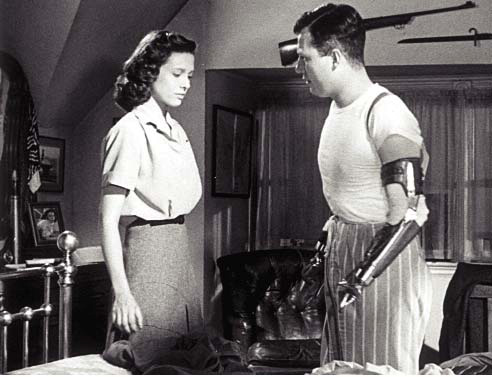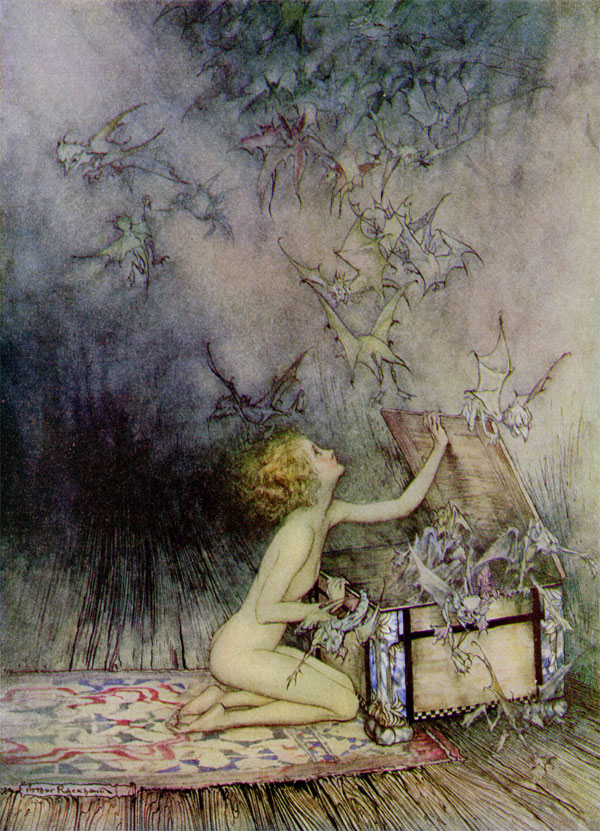War and Love
IN commemoration of D-Day, here is a moving love scene from the 1946 movie The Best Years of Our Lives.

IN commemoration of D-Day, here is a moving love scene from the 1946 movie The Best Years of Our Lives.

Laura F. writes:
Ever since your post about Kraja, it has been All Kraja, All the Time at my house. Every time I turn on the computer I am surrounded by little girls clamoring for Kraja videos. I think we have watched every recording of them on YouTube. Have you seen the one about “Lars Persson”? The tune is wonderful and the words are charming. Here is a rough translation (by a Swede, it seems) provided under the video: (more…)
THE PEW Research Center reports:
A record 14.6% of all new marriages in the United States in 2008 were between spouses of a different race or ethnicity from one another. This includes marriages between a Hispanic and non-Hispanic (Hispanics are an ethnic group, not a race) as well as marriages between spouses of different races — be they white, black, Asian, American Indian or those who identify as being of multiple races or “some other” race.
HERE IS a good article on the correlation between increased economic independence for women, often due to government assistance, and the emasculation of men in Britain. It complements recent discussions here about the decline in male achievement. Camilla Cavendish writes: (more…)

THERE has been hand-wringing in the mainstream press in recent years about the precociousness of girls today, about their increasingly sexualized attire and behavior. But none of this commentary approaches the perceptive analysis of Thomas F. Bertonneau in the previous entry on the pop phenomenon Miley Cyrus, who is 17. As Mr. Bertonneau points out, popular culture is waging an active assault on girlhood. But of course, as we know, popular culture is waging war on everything and anything that is good, wholesome, normal or sacred. (more…)
IF YOU liked the lovely songs by the Swedish female quartet Kraja that were posted here last week, please go back and view them again after you take a look at this clip of the teen star Miley Cyrus appearing on the show Britain’s Got Talent last night. Miley’s performance of her song Can’t be Tamed includes a prolonged kiss with another woman, or a person who is supposedly a woman but who looks like a punk demon. This kiss is not surprising. Even the vaunted Metropolitan Opera includes lesbian gestures in its productions. And, in everyday life, women who are not lesbians now regularly stroke, pet, and kiss each other with a level of sensuality once reserved for private moments and for lovers. Miley’s outfit, with its leather connotations of sexual fascism, is something you might see in a police state run by teen vixens. (more…)
LAWRENCE AUSTER writes:
Look at Nick Clegg in the photo in this entry. Have you noticed how men’s suit jackets today open too soon below the button, revealing the lower part of the tie instead of covering it? Obama introduced that look. Now it’s everywhere. I’m the only person I know who has noticed it. Do have any thoughts about what it signifies, culturally speaking?
In my view, it subverts the very idea of a suit, which is that it covers the man. (more…)
HERE is a bold, countercultural piece written in 1946 by a leading American psychiatrist. He contends the push for female equality will be a disaster because women are emotionally stunted and tend to abuse power. “Woman’s nature,” he writes, “in combination with the diverse compulsions and taboos of civilization, gives rise to a strong craving for mistreatment.” His words are prophetic.
Dr. Ralph S. Banay, a Columbia University professor whose essay appears in The Milwaukee Journal, says “the fair sex is emotionally childish, inclines toward crime, cruelty and deceit, and doesn’t really want equality with men,” but power over them. He writes:
“Woman’s emotional aspect simply has not gone along with the rest of her entity. Woman has become a big and powerful factor in business, the professions, the arts and community life, but emotionally she has hardly moved at all; emotionally she is still back where she was when her stone age counterpart was an object of the chase to be captured and subdued.”
He advises every woman to place these words in a prominent place: Women are not angelic.
It’s interesting that Banay was a psychiatrist. He would be horrified by psychologists today who push the idea that women are indeed angelic and that masculinity is a disorder.
JOHN LOCKHARD writes: The solution to Elise's problem seems obvious to me. You should add a matchmaking section to your website. I would love to find a woman who likes your website and wants to be a traditional housewife. Heck, Elise herself sounds fantastic, except that I'm eighteen years older than she is. There must be lots of scattered traditionalists who read your blog. Think of it as a way of multiplying your readership! Of course, there would be a certain delay. :-) Laura writes: The thought has occurred to me. The problem is, would there be liability issues? I will say that my recent fundraising campaign is prompted by both need and exhaustion. I'm about ready to sell my female readers to my male readers. : -)
IN RESPONSE to the entry on goddess spirituality, Thomas F. Bertonneau writes:
Under the provocation of Kristor’s insight and yours, I am following out some associations in respect of Gnosticism and our reigning elites. I remarked how the “Goddess writer” rejects scholarly diligence in favor of mystic autoscopy. (“The most important place to look for the Goddess is within yourself.”) Le moi – it’s an even easier reference than Wikipedia!
JAMES P. writes:
There is a New York Times story today about workplace protection for nannies. You will note, in the article, the assumption that the bill is a good thing because it will extend workplace protection to illegal immigrants. It is pretty much a given that the nanny will be foreign and probably in the country illegally.
This picture says it all — a black nanny with two white children in her care. Whatever happened to white women raising their own children?
THANK YOU to those who responded to my recent request for donations to this site. If you would like to see this blog remain in existence, and not go the way of so many one-person operations which peter out or suddenly disappear because of the enormous time and energy needed to sustain them, please give.
BRITISH PRIME MINISTER David Cameron and his deputy Nick Clegg recently delayed cabinet meetings so they could take their children to school. They say they will be doing more of the same in the future. Cameron will be taking paternity leave when his wife gives birth in September and Clegg may have more serious responsibilities as his wife is a top lawyer and reportedly the main breadwinner in the family. According to The Daily Mail, (more…)
IN THIS previous post, Elise, an 18-year-old high school graduate and an intelligent young woman who has thought about the direction of her life, has decided not to go to college. This is a daring thing to do because many of her friends are headed there. But Elise believes that college is unnecessary to achieve her ultimate goal: to be a wife and mother.
The problem is that college is also one of the chief institutions in modern culture for matchmaking. Gone are the traditions that brought young men and women together in other ways. Where is Elise going to even find a man to marry without going to college or, well, going somewhere? Will it take a miracle? Should she hope for a man to fall from the sky? (more…)

EARLY 21st century culture teems with goddess spirituality. We have shorn the new and reclaimed the old. A matriarchal society must have its she-gods, its polytheistic pantheon of feminine beings who suspiciously have little in common with the modern feminist. It’s interesting how the good goddess, rather than the vindictive or irrational or lustful goddess, dominates contemporary goddess culture.
Here’s a synopsis of goddess theology from one of the many feminine spirituality sites on the Internet:
In the beginning was the Great Mother, worshipped in an era when the ability to bring new life into the world was paramount – hence the elevated position of women in primitive society when the struggle just to survive left little time for anything else. Even when mankind found time to make statues and paint pictures in caves, the focus was still on the necessities of life – motherhood and successful hunting. The religious beliefs, which can be inferred from theses remains, also seem to focus on survival. (more…)
IS THE ANNOUNCED separation of Al and Tipper Gore simply a case of a husband and wife who have drifted apart and have decided mutually and amicably to go their separate ways? This is very unlikely.
At their advanced ages and after forty years of marriage, this picture of a mild and mutual parting does not make sense. More likely, this is a case of deep-seated anger or disappointment. Dissolving a longstanding marriage requires will and determination. The very essence of divorce, its romantic appeal to a generation of radical individualists, is in the will. A whole way of living and network of connections must be reordered. The life story is redefined, which may be especially thrilling on the brink of old age. It requires intense anger, bitter disillusionment, acute meaninglessness or some inner revolt against nature itself to motivate an individual to pursue this course when there is so little to gain and they face the latter stage of life without a spouse. (more…)
IT HAS been one year and four weeks since I started this blog. I was too busy posting to note the anniversary on May 5. There are now 703 entries in the archives, and they include many intelligent, funny, sad, wise and admonishing contributions from readers. It has been a year of curses and compliments. (more…)
THE ANSWER IS NO. They can reconstruct society from top to bottom, but they cannot tolerate each other. This is why liberalism is ultimately doomed.